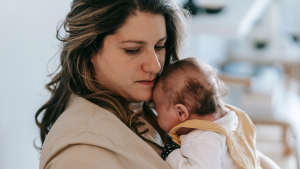
I often think about the impact of the pre and postnatal experience on parenting outcomes, and also how these experiences are so multi-faceted. Obviously, humans are complex and we are affected by health, relationships, experiences, environments and circumstances. While I have no wish to over-simplify such a complex process, the way we feel essentially affects our behaviour and health. This has implications for how we should be taking better care of mothers in pregnancy and the early postpartum. I’m not saying that all postnatal depression and anxiety can be prevented. But I am saying that some families are under extraordinary pressure, and if we can relieve some of that pressure, this can only be a good thing. Of course, depression can be made worse by many different triggers, and I’ll highlight some of them.
There have been numerous proposed mechanisms for why some people are more likely to suffer from postpartum mood disorders or postnatal depression. Kathy Kendall Tackett (2007) has proposed a link between raised pro-inflammatory cytokines in the third trimester of pregnancy, which increases inflammation. Comasco et al (2011) found that women giving birth in the Autumn/Winter had a greater likelihood of a genetic variation in their Brain Derived Neurotrophic Factor (BDNF). BDNF has a role in many different brain functions, and it seems from this study that women birthing in the colder months had more likelihood of having altered brain function as a result of the BDNF variation. Then there’s the link between lower vitamin D levels and increased risk of postnatal mood disorders – pregnancy puts people at risk for low vitamin D anyway, but this may be exacerbated in the colder months when sun exposure is more difficult or impossible. A study by Robinson et al (2014) found that low levels of Vitamin D in pregnancy made postnatal depression more likely.
There are of course hundreds of other reasons why the postpartum experience may be challenging and for some – downright miserable, but what is pretty obvious is that we need to try to optimise health, sleep, nutrition, and social care, as well as reduce stress and provide tailored support to need the needs of our pregnant friends, clients, colleagues and family members.
But this leads me to another sensitive question I’m often asked. Does parental depression affect little ones? Well, there’s no doubt that it can. But I prefer to focus on positives, and aspects of our lives that we can control. So I thought I would share an interesting piece of research which illustrates something that we can indeed have some element of control over. It’s a paper by Woodhouse and colleagues published in Child Development, and it discusses the importance of secure base provision, as opposed to sensitivity, in the promotion of secure attachment.
Sensitivity is the ability of a parent to recognise, accurately interpret, and promptly respond to infant cues. This is often called attunement, and is important as it promotes bonding, improves relationships and facilitates empathy and social awareness.
Secure base provision on the other hand, is similar to sensitivity, but is more specific to providing safety and interpreting attachment seeking behaviours – specifically crying, preventing exposure to and supporting through frightening experiences, and picking babies up and holding them chest to chest.
The authors carefully stress that both parental sensitivity and secure base provision are important, but note that some parents struggle with sensitivity, perhaps because they have not had a good role model, are themselves stressed, anxious or traumatised, or suffering from depression.
The paper found that it was secure base provision more than parental sensitivity that predicted secure attachment most. There seems to be a much smaller link between sensitivity and attachment than previously thought, and it is specifically those behaviours that provide safety during distress that is particularly important for secure attachment.
To me, this seems such a hopeful piece of research, as so many new parents struggle in the early days to ‘read’ their baby, or really feel attuned to them. Other parents are depressed, struggling or anxious. Placing the emphasis on the core priority of providing a secure base, rather than parents feeling like they have to accurately interpret every facial expression, noise or movement, may be more realistic and achievable. Of course, attunement can greatly increase bonding and relationships, but taking the pressure off may reduce anxiety for people.
If you’d like to read more about attachment, responsiveness and the importance of support, you’ll find both my books Let’s talk about your new family’s sleep, and Still Awake helpful, as well as my Responsive Sleep Support class. For a quick and succinct solution focused guide, check out my 0-18 month guide.

Leave A Comment
You must be logged in to post a comment.